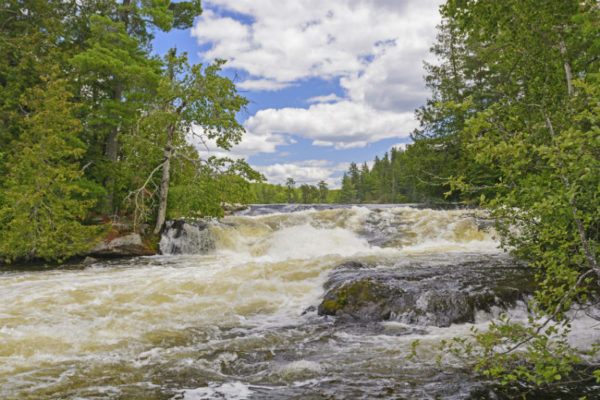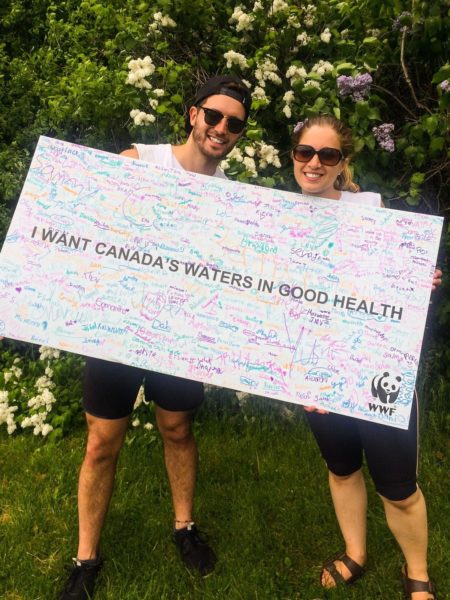Inaccessible or unmonitored: the trouble with water data in Canada
A disturbing trend is emerging as we reach the 75 per cent mark in our work to assess the health of Canada’s 25 major freshwater ecosystems and accurately understand the threats they face.
For far too many watersheds, basic water quality information is inaccessible. That’s because it’s locked away in the proprietary reports of corporations or tucked away in a file somewhere in an organization that is understaffed with overworked people. Or because it’s simply not being collected in the first place.

That’s a remarkable thing, when you consider the fundamental role that water plays in all our lives, and the value we Canadians place on freshwater as a resource and part of our identity.
Even in some of Canada’s most densely populated and highly developed watersheds, such as the Great Lakes, we don’t know the health of the waters that underpin our wellbeing and our economies.
At WWF-Canada, we view freshwater as one of Canada’s most precious natural resources. It sustains us all, people and wildlife, and without access to a dependable supply of healthy freshwater, species suffer and our lifestyle and livelihoods are undermined. As Canadians, we have taken this resource for granted, assuming our bountiful supply of clean water would never run out. We haven’t done enough to look at these watersheds in relation to each other, and the overall state of freshwater in the country.
By working with conservation authorities, local environmental organizations and various levels of government, we’re trying to change that. This first-ever nationwide assessment of freshwater ecosystems is designed to give Canadian decision makers the big data they need to make smart choices for the long-term health of our freshwater ecosystems. But it can only work if the data is being collected, and being made available. Openness and transparency are essential.
Earlier this week, the federal government announced a review of environmental and regulatory processes with the goal of restoring public trust in decision making. Without openness and transparency, that goal isn’t attainable. A move to modernize the environmental assessment and regulatory review is a move in the right direction, but that review should result in action. And fast.
The first step is to ensure data is collected on the current health of all our freshwater ecosystems, and on the level of threat that pollution, overuse, invasive species, habitat loss and fragmentation, and climate change pose to those systems. Smart development decisions can’t be made without understanding current conditions and potential impacts on our water supply.
Simultaneously, the government’s review should result in open and free access to freshwater data by making transparency mandatory, regardless of who collects that data and for what purpose – whether it’s a mining company, a spring water bottler or an environmental group keeping tabs on the health of a stream or river.
WWF-Canada’s freshwater assessments analyses are accessible and available to everyone – watershed advocates, scientists, governments and everyday citizens. These seven new watershed reports we recently released were funded by HSBC Bank Canada as part of its global 150th anniversary community fund. You can find the results here. But we’re not counting on the data to speak for itself. We are also collaborating with water stewardship groups who are advocating for better water policies with local, provincial and federal governments. Across Canada, watersheds are facing a series of significant threats which, left unchecked, will jeopardize the health of water resources.

From a lack of accessible data on overall water health, and the results from our threats assessment, it’s clear we should all be concerned for the future of this natural resource.
What can you do? Support for WWF’s research continues to be crucial to our success. We are building a network of people who are keen to take action to ensure that all Canada’s waters are in good health. Earlier this week, 200 people joined our webinar to learn about the national results to date, and at the recent Peel Children’s Water Festival in Brampton, Ont., hundreds of kids got excited about seeing Canada’s waters in good health. They quickly understood that access to clean freshwater now and in the future is important for their quality of life and the health of other species, too. We invite you to help make this vision for healthy waters a reality. Take the plunge and commit to ensuring healthy waters for Canada.
